LIMS, which stands for Laboratory Information Management System, plays a crucial role in the pharmaceutical industry by enabling interconnectivity across various laboratory processes. Let’s delve into more detailed information about the interconnectivity aspect of LIMS:
- Seamless Integration: LIMS integrates with a wide range of laboratory instruments and equipment, allowing for automated data acquisition and analysis. It eliminates manual data transcription, reducing errors and saving time.
- Instrument Interfacing: LIMS can communicate with instruments such as chromatographs, spectrometers, and automated liquid handlers. It collects data directly from these instruments, eliminating the need for manual data entry. This connectivity ensures accurate and timely data transfer between the laboratory equipment and the LIMS.
- Data Exchange: LIMS facilitates seamless data exchange between different stakeholders involved in the pharmaceutical manufacturing process. It can share information with other systems like Enterprise Resource Planning (ERP) systems, Electronic Lab Notebooks (ELN), and Quality Management Systems (QMS). This interoperability ensures efficient collaboration and information flow across departments.
- Regulatory Compliance: LIMS aids in regulatory compliance by maintaining data integrity and traceability throughout the laboratory processes. It captures and manages critical information such as sample data, test results, and instrument calibration records. This interconnected system allows for easy access to information required during audits and regulatory inspections.
- Workflow Automation: LIMS provides a standardized and streamlined workflow for various laboratory operations. By interconnecting different processes, it automates sample tracking, workflow execution, and result generation. This automation helps ensure consistency, reduces manual errors, and enhances overall productivity.
- Report Generation: LIMS enables the generation of custom reports and analysis, which can be shared with stakeholders. It allows users to extract relevant data and present it in meaningful formats, facilitating decision-making processes.
In summary, LIMS in the pharmaceutical industry not only serves as a centralized data management system but also connects laboratory instruments, systems, and stakeholders. This interconnectivity enhances efficiency, data integrity, regulatory compliance, and collaboration, ultimately contributing to improved productivity and quality in pharmaceutical research, development, and manufacturing.




